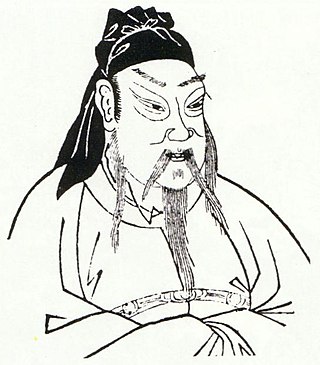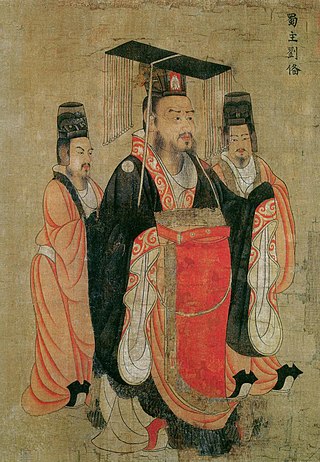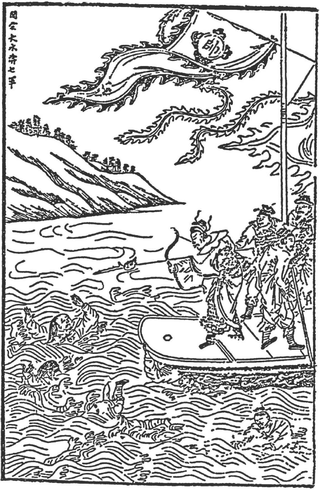Related Research Articles

Guan Yu, courtesy name Yunchang, was a Chinese military general serving under the warlord Liu Bei during the late Eastern Han dynasty of China. Along with Zhang Fei, he shared a brotherly relationship with Liu Bei and accompanied him on most of his early exploits. Guan Yu played a significant role in the events leading up to the end of the Han dynasty and the establishment of Liu Bei's state of Shu Han during the Three Kingdoms period. While he is remembered for his loyalty towards Liu Bei, he is also known for repaying Cao Cao's kindness by slaying Yan Liang, a general under Cao Cao's rival Yuan Shao, at the Battle of Boma. After Liu Bei gained control of Yi Province in 214, Guan Yu remained in Jing Province to govern and defend the area for about seven years. In 219, while he was away fighting Cao Cao's forces at the Battle of Fancheng, Liu Bei's ally Sun Quan broke the Sun–Liu alliance and sent his general Lü Meng to conquer Liu Bei's territories in Jing Province. By the time Guan Yu found out about the loss of Jing Province after his defeat at Fancheng, it was too late. He was subsequently captured in an ambush by Sun Quan's forces and executed.

Zhang Liao, courtesy name Wenyuan, was a Chinese military general serving under the warlord Cao Cao in the late Eastern Han dynasty of China. He served briefly in the state of Cao Wei, founded by Cao Cao's successor Cao Pi, in the early Three Kingdoms period before his death. Formerly a subordinate of other warlords such as Ding Yuan, Dong Zhuo and Lü Bu, Zhang Liao joined Cao Cao around 198 after Lü Bu's downfall at the Battle of Xiapi. Since then, he participated in many of Cao Cao's military campaigns, including those against Yuan Shao's heirs and the Wuhuan tribes from 201 to 207. He is best known for his pivotal role in the Battle of Xiaoyao Ford in 214–215, in which he successfully defended Hefei from the forces of the warlord Sun Quan.

The Battle of Xiaoting (猇亭之戰), also known as the Battle of Yiling and the Battle of Yiling and Xiaoting, was fought between the state of Shu and the state of Wu, between the years 221 and 222 in the early Three Kingdoms period of China. The battle is significant because Wu was able to turn the situation from a series of initial losses into a defensive stalemate, before proceeding to win a decisive victory over Shu. The Wu victory halted the Shu invasion and preceded the death of Liu Bei, Shu's founding emperor.

Liu Bei, courtesy name Xuande (玄德), was a Chinese warlord in the late Eastern Han dynasty who later became the founding emperor of Shu Han, one of the Three Kingdoms of China. Although he was a distant relative of the Han imperial family, Liu Bei's father died when he was a child and left his family impoverished. To help his mother, he sold shoes and straw mats. When he reached the age of fifteen, his mother sent him to study under Lu Zhi. In his youth, Liu Bei was known as ambitious and charismatic. He gathered a militia army to fight the Yellow Turbans. Liu Bei fought bravely in many battles and grew famous for his exploits. Later, he participated in the coalition against Dong Zhuo, following this joined his childhood friend Gongsun Zan and fought under him against Yuan Shao.

Lü Meng, courtesy name Ziming, was a Chinese military general and politician who served under the warlord Sun Quan during the late Eastern Han dynasty of China. Early in his career, he fought in several battles under the banner of Sun Ce, Sun Quan's elder brother and predecessor. Although he had been noted for his bravery, he was still deemed as nothing more than a "mere warrior" for his lack of literacy skills. Later, with encouragement from Sun Quan, Lü Meng took up scholarly pursuits to improve himself, gradually becoming a learned and competent military leader. In 217, he succeeded Lu Su as the frontline commander of Sun Quan's forces in Jing Province. Two years later, in a carefully calculated military operation, Lü Meng led an invasion of Liu Bei's territories in southern Jing Province, swiftly and stealthily capturing all the lands from Liu Bei's general Guan Yu, who was captured and executed after his defeat. Lü Meng enjoyed his finest hour after the victory but died a few months later because he was already seriously ill before the campaign.

Zhang Fei, courtesy name Yide, was a Chinese military general and politician serving under the warlord Liu Bei in the late Eastern Han dynasty and early Three Kingdoms period of China. Zhang Fei and Guan Yu, who were among the earliest to join Liu Bei, shared a brotherly relationship with their lord and accompanied him on most of his early exploits. Zhang Fei fought in various battles on Liu Bei's side, including the Red Cliffs campaign (208–209), takeover of Yi Province (212–214), and Hanzhong Campaign (217–218). He was assassinated by his subordinates in 221 after serving for only a few months in the state of Shu Han, which was founded by Liu Bei earlier that year.
Lu Xun, courtesy name Boyan, also sometimes referred to as Lu Yi, was a Chinese military general and politician of the state of Eastern Wu during the Three Kingdoms period of China. He started his career as an official under the warlord Sun Quan in the 200s during the late Eastern Han dynasty and steadily rose through the ranks. In 219, he assisted Sun Quan's general Lü Meng in an invasion of Jing Province, which led to the defeat and death of Liu Bei's general Guan Yu. In 222, he served as the field commander of the Wu army in the Battle of Xiaoting against Liu Bei's forces and scored a decisive victory over the opponent. Lu Xun reached the pinnacle of his career after this battle as Sun Quan regarded him more highly, promoted him to higher positions and bestowed upon him unprecedented honours. Throughout the middle and later parts of his career, Lu Xun oversaw both civil and military affairs in Wu while participating in battles against Wu's rival state, Wei, from time to time. In his final years, Lu Xun was drawn into a succession struggle between Sun Quan's sons and fell out of Sun Quan's favour as a consequence. He managed to retain his appointment as Imperial Chancellor – an office he assumed in 244 – but died a year later in frustration. Lu Xun's role in the Wu government was likened to that of a custos morum as he believed firmly in and upheld Confucian principles and practices. On the one hand, he provided constant and timely advice to Sun Quan to exercise benevolence and consider the welfare of the people. On the other hand, he vehemently objected to Sun Quan's idea of replacing his legitimate heir apparent in favour of a younger son.

Cao Ren, courtesy name Zixiao, was a military general serving during the late Eastern Han dynasty of China under the warlord Cao Cao, who was also his older second cousin. He continued serving in the state of Cao Wei – founded by Cao Cao's son and successor, Cao Pi – during the Three Kingdoms period. He played a significant part in assisting Cao Cao in the civil wars leading to the end of the Han dynasty. He was appointed as the Grand Marshal (大司馬) when Cao Pi ascended the throne, and was also credited by the latter for the establishment of Wei. However, Cao Ren was also once derided as a mediocre commander by Zhu Huan, a general from Wei's rival state Eastern Wu.

Guo Jia, courtesy name Fengxiao, was an adviser to the warlord Cao Cao during the late Eastern Han dynasty of China. Throughout his 11 years of service, Guo Jia aided Cao Cao greatly with his brilliance and foresight, and his strategies were instrumental to Cao Cao's triumphs over rival warlords such as Lü Bu and Yuan Shao. For example, four years before Cao Cao's decisive victory over Yuan Shao at the Battle of Guandu, Guo Jia already foresaw that Cao Cao would win when he pointed out ten advantages Cao Cao had over Yuan Shao.

Pang De, courtesy name Lingming, was a Chinese military general who lived during the late Eastern Han dynasty. He started his career under the warlord Ma Teng, who was based in Liang Province. In 211, Ma Teng's son Ma Chao, along with a coalition of warlords from Liang Province, started a rebellion against the Han central government, which was controlled by the warlord Cao Cao. After Cao Cao defeated Ma Chao and the coalition at the Battle of Tong Pass, Ma Chao fled to Hanzhong Commandery and took shelter under the warlord Zhang Lu. Pang De accompanied him to Hanzhong. When Ma Chao defected from Zhang Lu's side in order to join the warlord Liu Bei, Pang De remained in Hanzhong and eventually came to serve Cao Cao after Cao Cao defeated Zhang Lu at the Battle of Yangping and took over Hanzhong. In 219, Pang De fought at the Battle of Fancheng under Cao Ren's command against Liu Bei's forces led by Guan Yu. Pang De was captured in battle and eventually executed by Guan Yu when he refused to surrender.

Yu Jin, courtesy name Wenze, was a Chinese military general serving under the warlord Cao Cao in the late Eastern Han dynasty of China. He joined Cao Cao in 192 around the start of the civil wars leading to the collapse of the dynasty, and fought in many of the campaigns which established the warlord's position as a central figure in that period. In 219, Yu Jin was tasked with leading forces to relief Cao Cao's general Cao Ren, who was being besieged in Fancheng by Liu Bei's general Guan Yu, but his armies were destroyed in a flood due to heavy rains. Yu Jin surrendered to Guan Yu and became a prisoner-of-war, but was transferred to the custody of another warlord, Sun Quan, after Sun Quan's forces captured Guan Yu's bases in late 219. Sun Quan treated Yu Jin like a guest and in 221 sent him back to the state of Cao Wei, which was founded in late 220 by Cao Cao's successor, Cao Pi, who ended the Eastern Han dynasty. Cao Pi pardoned Yu Jin and restored him to the position of a general. However, Yu Jin died later that year in regret after visiting Cao Cao's tomb, where he saw illustrations of the Battle of Fancheng depicting his surrender to Guan Yu.

Xun You, courtesy name Gongda, was a statesman who lived during the late Eastern Han dynasty of China and served as an adviser to the warlord Cao Cao. Born in the influential Xun family of Yingchuan Commandery, Xun You was recruited into the civil service by the general He Jin. When the warlord Dong Zhuo hijacked and controlled the Han central government between 189 and 192, Xun You plotted with four others to assassinate him but was discovered and imprisoned. Following his release after Dong Zhuo's death, he wanted to serve as the Administrator of Shu Commandery but eventually settled as an official in Jing Province.

Meng Da, courtesy name Zidu, was a military general of the state of Cao Wei during the early Three Kingdoms period of China. He previously served the warlords Liu Zhang and Liu Bei during the late Eastern Han dynasty before defecting to Wei. In Wei, he served under the first two rulers, Cao Pi and Cao Rui. Around late 227, he started a rebellion in Wei and aimed to rejoin the Shu-Han but the revolt was swiftly suppressed by the Wei general Sima Yi. Meng Da was captured and executed for treason.

The Battle of Fancheng or the Battle of Fan Castle was fought between the warlords Liu Bei and Cao Cao in 219 in the late Eastern Han dynasty. It is named after Fancheng in present-day Xiangyang, Hubei, a fortress that played a significant role in the battle.
Tian Yu, courtesy name Guorang, was a military general of the state of Cao Wei during the Three Kingdoms period of China.

Lü Meng's invasion of Jing Province was fought between the warlords Sun Quan and Liu Bei in the winter of 219–220 in the late Eastern Han dynasty. Sun Quan's forces, led by Lü Meng, invaded Liu Bei's territories in southern Jing Province, which covered present-day Hubei and Hunan. The campaign occurred after the Battle of Fancheng and concluded with victory for Sun Quan's forces, who completely captured all of Liu Bei's territories. Guan Yu, Liu Bei's general guarding those territories, was captured and executed by Sun Quan's forces. The fall of Jing Province and Guan Yu's death provided the trigger for the Battle of Xiaoting between Liu Bei and Sun Quan between 221 and 222.
The Hanzhong Campaign was a military campaign launched by the warlord Liu Bei to seize control of Hanzhong Commandery from his rival, Cao Cao. The campaign took place between December 217 and August 219 during the prelude to the Three Kingdoms period. Although Cao Cao's forces had settled in Hanzhong Commandery two years prior after the Battle of Yangping, they were worn out by an overall Fabian strategy employed by Liu Bei's forces, who used targeted attacks to capture strategic locations from the enemy. One of these attacks resulted in the death of Xiahou Yuan, one of Cao Cao's top generals, delivering a huge blow to the morale of Cao Cao's forces. Due to logistical and other issues, Cao Cao was eventually forced to abandon Hanzhong Commandery and order a retreat in June 219. Liu Bei emerged victorious in the campaign and occupied Hanzhong Commandery, after which he declared himself "King of Hanzhong" in August of that year.
Wei Feng, courtesy name Zijing, was a government official who lived in the late Eastern Han dynasty of China.
Zhao Yan, courtesy name Boran, was a government official and military general of the state of Cao Wei during the Three Kingdoms period of China. He previously served under the warlord Cao Cao during the late Eastern Han dynasty.
The Sun–Liu territorial dispute was a military conflict between the warlords Sun Quan and Liu Bei in 215 during the late Eastern Han dynasty of China. While Sun Quan and Liu Bei had initially formed an alliance in 208 against their common rival Cao Cao, both sides got into a territorial dispute over the territories in southern Jing Province in the early 210s. The dispute ended when both sides agreed to divide the territories along the Xiang River between their respective domains: Sun Quan took the lands east of the river while Liu Bei kept those west of the river. Despite a peaceful settlement to the territorial dispute, Sun Quan ultimately sent his forces to attack Liu Bei's territories in an invasion in 219 and succeeded in capturing all of them.
References
- ↑ (太和六年, ... 在位二年遜位, ... 薨。謚曰景侯。) Sanguozhi vol. 14.
- ↑ According to the chronology of Liu Ye's biography in Sanguozhi, he was in his 20s while serving under Liu Xun. Liu Xun was independent only in 199, after Yuan Shu's death. By calculation, Liu Ye's birth year should be in the 167s.
- ↑ (而母病困。临终,戒涣、晔以“普之侍人,有谄害之性。身死之后,惧必乱家。汝长大能除之,则吾无恨矣。) Sanguozhi, vol. 14
- ↑ (普怒,遣人追晔。) Sanguozhi, vol. 14
- ↑ 晔还拜谢曰:“亡母顾命之言,敢受不请擅行之罚。”普心异之,遂不责也。 Sanguozhi, vol. 14
- ↑ (汝南许劭名知人,避地扬州,称晔有佐世之才。) Sanguozhi, vol.14
- ↑ (宝最骁果,才力过人,一方所惮。欲驱略百姓越赴江表) Sanguozhi, vol. 14
- ↑ (会太祖遣使诣州,有所案问。晔往见,为论事势,要将与归,驻止数日) Sanguozhi, vol. 14
- ↑ (宝果从数百人赍牛酒来候使), Sanguozhi, vol. 14
- ↑ (晔因自引取佩刀斫杀宝,斩其首以令其军,云:“曹公有令,敢有动者,与宝同罪。”) Sanguozhi, vol. 14
- ↑ (晔睹汉室渐微,己为支属,不欲拥兵, 遂委其部曲与庐江太守刘勋) Sanguozhi, vol. 14
- ↑ (勋不从。兴兵伐上缭,策果袭其后。勋穷踧,遂奔太祖。) Sanguozhi, vol. 14
- ↑ (《傅子》曰:初,太祖时,魏讽有重名,自卿相以下皆倾心交之。其后孟达去刘备归文帝,论者多称有乐毅之量。晔一见讽、达而皆云必反,卒如其言。) Fu Zi annotation in Sanguozhi, vol.14
- ↑ (黄初元年,....诏问群臣令料刘备当为关羽出报吴不。众议咸云:“蜀,小国耳,名将唯羽。羽死军破,国内忧惧,无缘复出。”晔独曰:“蜀虽狭弱,而备之谋欲以威武自强,势必用众以示其有馀。且关羽与备,义为君臣,恩犹父子;羽死不能为兴军报敌,于终始之分不足。) Sanguozhi, vol.14. Note that Chen Shou did not explicitly indicate who was the "father" or "son" in the relationship between Guan Yu and Liu Bei.
- ↑ (达率部曲四千馀家来降。达有容止才观,王甚器爱之,引与同辇,以达为散骑常侍、建武将军,封平阳亭侯。合房陵、上庸、西城三郡为新城,以达领新城太守,委以西南之任。行军长史刘晔曰:“达有苟得之心,而恃才好术,必不能感恩怀义。新城与孙、刘接连,若有变态,为国生患。”王不听。) Zizhi Tongjian, vol.69
- ↑ (黄初元年,以晔为侍中,赐爵关内侯。诏问群臣令料刘备当为关羽出报吴不。众议咸云:“蜀,小国耳,名将唯羽。羽死军破,国内忧惧,无缘复出。”晔独曰:“蜀虽狭弱,而备之谋欲以威武自强,势必用众以示其有馀。且关羽与备,义为君臣,恩犹父子;羽死不能为兴军报敌,于终始之分不足。”) Sanguozhi, vol.14
- ↑ (后备果出兵击吴。吴悉国应之,而遣使称籓。朝臣皆贺,独晔曰:“吴绝在江、汉之表,无内臣之心久矣。陛下虽齐德有虞,然丑虏之性,未有所感。因难求臣,必难信也。彼必外迫内困,然后发此使耳,可因其穷,袭而取之。夫一日纵敌,数世之患,不可不察也。”) Sanguozhi, vol.14
- ↑ (辽还屯雍丘,得疾。帝遣侍中刘晔将太医视疾...) Sanguozhi, vol. 17
- ↑ (文帝问侍中刘晔等:“武都太守何如人也?”皆称阜有公辅之节。未及用,会帝崩。) Sanguozhi, vol. 25
- ↑ (《傅子》曰:或恶晔于帝曰:“晔不尽忠,善伺上意所趋而合之。陛下试与晔言,皆反意而问之,若皆与所问反者,是晔常与圣意合也。复每问皆同者,晔之情必无所逃矣。”帝如言以验之,果得其情,从此疏焉.) Fu Zi annotation in Sanguozhi, vol. 14
- Chen, Shou (3rd century). Records of the Three Kingdoms (Sanguozhi).
- Pei, Songzhi (5th century). Annotations to Records of the Three Kingdoms (Sanguozhi zhu).